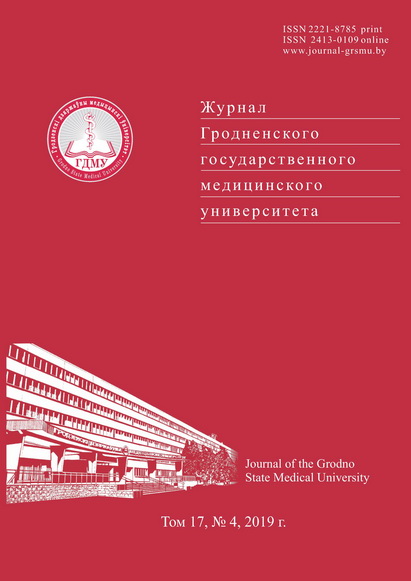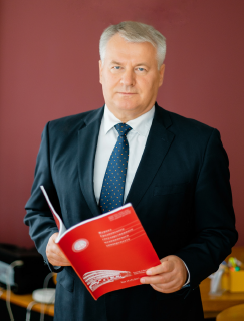ГИПОТАЛАМИЧЕСКИЙ СИНДРОМ. РОЛЬ ГИПОТАЛАМУСА В ФОРМИРОВАНИИ ПИЩЕВОГО ПОВЕДЕНИЯ И ОЖИРЕНИЯ
Аннотация
Причины избыточной массы тела и ожирения многообразны. В их основе лежит нарушение энергетического баланса, гиподинамия, а также нарушение нейроэндокринных механизмов, которые играют важную роль в формировании пищевого поведения человека. В настоящем обзоре проанализированы литературные сведения о взаимосвязи гипофиза, гипоталамуса, гормонов и нейромедиаторов в формировании пищевого поведения и ожирения.
Литература
Artymuk NV, Ushakova GA. Sovremennye predstavlenija o gipotalamicheskom sindrome [Modern ideas about the hypothalamic syndrome]. Mat i Ditja v Kuzbasse [Mother and Baby in Kuzbass]. 2001;1:24-27. (Russian).
Shilkin VV, Filimonov VI. Anatomija po Pirogovu. Atlas anatomii cheloveka [Anatomy according to Pirogov. Atlas of Human Anatomy]. Vol. 2. Moskva: GJeOTAR-Media; 2013. 736 р. (Russiаn).
Chernysheva MP, Nozdrachev AD. Nejrojendokrinnyj gipotalamus kak gomeostat jendogennogo vremeni [Neuroendocrine hypothalamus as a homeostat of endogenous time]. Zhurnal jevoljucionnoj biohimii i fiziologii [Journal of evolutionary biochemistry and physiology]. 2017;53(1):3-15. https://doi.org/10.1134/S002209301701001X (Russiаn).
Zhukovec IV, Bystrickaja TS, Koneeva EJa, Putiiceva OG. Jetiologija i patogenez disfunkcii gipotalamusa: sovremennyj vzgljad na problemu [Etiology and pathogenesis of hypothalamus dysfunction: modern view on the problem]. Bjullete fiziologii i patologii dyhanija [Bulletin physiology and pathology of respiratory]. 2011;42:96-100. (Russiаn).
Uvarova EV, Hashhenko EР. Gipotalamicheskaja disfunkcija: jetiopatogenez i klinika (obzor literatury) [Hypothalamic dysfunction: etiopathogenesis and clinical picture (literature review)]. Reproduktivnoe zdorove detej i podrostkov [Reproductive health of children and adolescents]. 2010;1:35-47. (Russian).
Vejn AM, Voznesenskaja Т. Gipotalamicheskij sindrom[Hypothalamic syndrome]. Vrach [The Doctor]. 2000;4:12-14. (Russian).
Swaab DS. The Human Hypothalamus: Basic and Clinical Aspects. Part I. In: Handbook of Clinical Neurology. Vol. 79. London: Elsevier; 2003. p. 476.
Swaab DS. The Human Hypothalamus: Basic and Clinical Aspects. Part II. In: Handbook of Clinical Neurology. Vol. 80. London: Elsevier; 2004. p 597.
Loeuille GA, Parscau L de, Ythier Н, Beaufrere В, Chatelain Р, François R. Hypothalamic dysfunction. Two causes: the contribution of nuclear magnetic resonance, therapeutic trial of naltrexon. Pediatrie.1989;44(3):203-212.
Romancоva TI. Jepidemija ozhirenija: ochevidnye i verojatnye prichiny [Obesity epidemic: obvious and probable causes]. Ozhirenie i metabolism [Obesity Metabolism]. 2011;1:5-17. https://doi.org/10.14341/2071-8713-5186 (Russiаn).
Berezina MV, Mihaleva OG, Bardymova ТР. Ozhirenie, mehanizmy razvitija [Obesity, developmental mechanisms]. Sibirskij medicinskij zhurnal [Siberian Medical Journal]. 2012;7:16. (Russiаn).
Guénard F, Houde А, Bouchard L, Tchernof А, Deshaies Y, Biron S, Lescelleur О, Biertho L, Marceau S, Pérusse L, Vohl M. Association of LIPA Gene Polymorphismswith Obesity-Related Metabolic Complications Among Severely Obese Patients. Obesity. 2012;20(10):2075-2082. https://doi.org/10.1038/oby.2012.52
Kogaj MA, Pinhasov ВВ, Seljatickaja VG. Osobennosti metabolicheskogo sindroma u muzhchin i zhenshhin s izbytochnoj massoj tela i ozhireniem [Features of the metabolic syndrome in men and women with overweight and obesity]. Bjulleten Vostochno-Sibirskogo nauchnogo centra Sibirskogo otdelenija Rossijskoj akademii medicinskih nauk [Bulletin of the East-Siberian Scientific Center of the Siberian Branch of the Russian Academy of Medical Sciences]. 2008;2:22-23. (Russiаn).
Zaslavskij AJu, Kuprinenko NV, editors. Lechenie ozhirenija u vzroslyh. Evropejskie klinicheskie rekomendacii 2008. [Treatment of Obesity in Adults. European Clinical Recommendations 2008]. Doneck: Izdatel Zaslavskij AJu; 2011. 32 р. (Russiаn).
James, W. The epidemiology of obesity: the size of the problem. J. Intern Med. 2008;263(4):336-352. https://doi.org/10.1111/j.1365-2796.2008.01922.x
Prilepskaja VN, Callagova EV. Patogeneticheskie aspekty ozhirenija i narushenija reproduktivnoj funkcii zhenshhiny [Pathogenetic aspects of obesity and impaired reproductive function of women]. Akusherstvo i ginekologija [Obstetrics and Gynecology]. 2006;5:51-55. (Russiаn).
Rapoport SI, Loboda AJu. Problema ozhirenija v klinike vnutrennih boleznej [The problem of obesity in the clinic of internal diseases]. Klinicheskaja medicina [Clinical Medicine]. 2008;11:15-23. (Russiаn).
Kovarenko MA, Rujatkina LA. Rozovye strii pri ozhirenii: gipotalamicheskij sindrom ili displazija soedinitelnoj tkani? [Pink striae in obesity: hypothalamic syndrome or connective tissue dysplasia?]. Kubanskij nauchnyj medicinskij vestnik [Kuban Scientific Medical Bulletin]. 2009;6:54-56. (Russiаn).
Bubnova MG. Ozhirenie: prichiny i mehanizmy narastanija massy tela, podhody k korrekcii [Obesity: causes and mechanisms of weight gain, approaches to correction]. Consilium medicum. 2005;5:7-12. (Russiаn).
Vorohobina NV, Volkova ЕА. Ozhirenie [Obesity]. In: Baranov VL, Borovik NV, Volkova EA, Vorohobina NV, Gabelova KA. Jendokrinologija [Endocrinology]. Vol. 2. Sankt-Peterburg: SpecLit; 2011. p. 392-432. (Russiаn).
Hvostova OI, Koltun VZ, Lobykina EN. Sovremennye podhody k lecheniju ozhirenija pri jemociogennom tipe narushenija pishhevogo povedenija [Modern approaches to the treatment of obesity in the emotiogenic type of eating disorders]. Sibirskij medicinskij zhurnal [Siberian Medical Journal]. 2005;53(4):50-53. (Russiаn).
Donahoo WT, Hernandez TL, Costa JL, Jensen DR, Morris АМ, Brennan МВ, Hochgeschwender U, Eckel RН. Plasma alpha-melanocyte-stimulating hormone: sex differences and correlations with obesity. Metabolism. 2009;58(1):16-21. https://doi.org/10.1016/j.metabol.2008.07.028
Shvarc V. Zhirovaja tkan kak jendokrinnyj organ [Adipose tissue as an endocrine organ]. Problemy jendokrinologii [Problems of Endocrinology]. 2009;1:38-44. https://doi.org/10.14341/probl200955138-43 (Russiаn).
Dedov II, Melnichenko GA. Ozhirenie: jetiologija, patogenez, klinicheskie aspekty [Obesity: etiology, pathogenesis, clinical aspects]. Moskva: Medicinskoe informacionnoe agentstvo; 2006. 456 р. (Russiаn).
Heptulla R, Smitten А, Teague В, Tamborlane WV, Ma YZ, Caprio S. Temporal patterns of circulating leptin levels in lean and obese adolescents: relationship to insulin, growth hormone, and free acids rhythmicity. J. Clin Endocrinol Metab. 2001;86(1):6-90. https://doi.org/10.1210/jcem.86.1.7136
Kilessa VV, Zhukova NV, Shkadova MG, Kostyukova EA. Involjutivnyj gipotalamicheskij sindrom [Involutive hypothalamic syndrome]. Krymskij terapevticheskij zhurnal [Crimean Journal of Internal Diseases]. 2017;1(32):38-40. (Russiаn).
Starostina EG. Ozhirenie kak psihosomaticheskoe zabolevanie [Obesity as a psychosomatic illness]. Ozhirenie i metabolism [Obesity Metabolism]. 2005;3:18-25. https://doi.org/10.14341/2071-8713-4848 (Russiаn).
Baranov SN, Kiseleva ММ. Reguljacija jekspressii gormona leptina. Interaktivnaja nauka. 2017;1(11):31-32. https://doi.org/10.21661/r-116212 (Russiаn).
Filippov OS, Kovalenko MV. Vlijanie insulinopodobnogo faktora rosta-I (IPFR-I) na stanovlenie reproduktivnoj funkcii u devushek pri ozhirenii [The effect of insulin-like growth factor-I (IPFR-I) on the formation of reproductive function in girls with obesity]. Sibirskij medicinskij zhurnal [Siberian Medical Journal]. 2005;55(6):41-43. (Russiаn).
DiBaise JК, Zhang Н, Crowell MD, Krajmalnik-Brown R, Decker GA. Rittmann ВЕ. Gut microbiota and its possible relationship with obesity. Mayo Clin. Proc. 2008;83(4):28-32. https://doi.org/10.4065/83.4.460
Burkov SG, Ivleva AJa. Izbytochnyj ves i ozhirenie - problema medicinskaja, a ne kosmeticheskaja [Overweight and obesity is a medical problem, not a cosmetic one]. Ozhirenie i metabolism [Obesity Metabolism]. 2010;3:15. https://doi.org/10.14341/2071-8713-4978 (Russiаn).
Kosygina AV. Adipocitokiny v nauchnoj i klinicheskoj praktike [Adipocytokines in scientific and clinical practice]. Ozhirenie i metabolism [Obesity Metabolism]. 2011;1:32-39. https://doi.org/10.14341/2071-8713-5189 (Russiаn).
Kosygina AV, Vasjukova OV. Novoe v patogeneze ozhirenija: adipokiny - gormony zhirovoj tkani [New in the pathogenesis of obesity: adipokines - adipose tissue hormones]. Problemy jendokrinologii [Problems of endocrinology]. 2009;1:44-51. https://doi.org/10.14341/probl200955144-50 (Russiаn).
Hvostova OI, Koltun VZ, Lobykina EN. Znachenie kompleksnogo podhoda (dieto- i psihoterapii) v lechenii izbytochnogo vesa i ozhirenija [The value of an integrated approach (diet and psychotherapy) in the treatment of overweight and obesity]. Sibirskij medicinskij zhurnal [Siberian Medical Journal]. 2004;47(6):48-50. (Russiаn).































